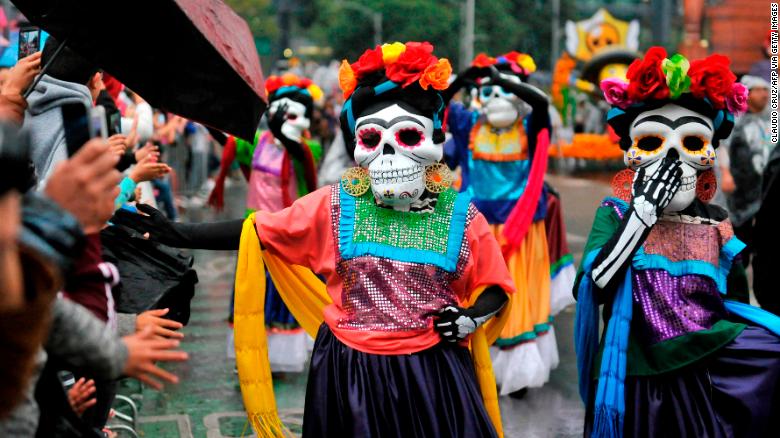Mexico’s Día de Muertos, or Day of the Dead, is a yearly celebration to remember and honor loved ones who have died. This year there are too many to celebrate as more than 90,000 Mexicans have died of Covid-19.
Mexican President Andrés Manuel López Obrador issued a decree for three days of national mourning to take place during Day of the Dead celebrations. The holiday runs over the course of two days on November 1-2, while the three days of national mourning will start one day earlier on October 31.
The holiday is usually a colorful and lively event, where families gather in cemeteries to dance and sing and build altars known as “ofrendas” made of photographs, bright marigold flowers, and special food, drinks and tokens that were cherished by their lost relative.
The Mexican government has asked that cemeteries around the country remain closed, cutting access to the graves where ofrendas are built. Mexico City Mayor Claudia Sheinbaum also said that the city’s 120 cemeteries would be closed on November 1-2. Sheinbaum announced she had tested positive for Covid-19 on Tuesday.
Deputy Health Minister Hugo Lopez-Gatell told reporters earlier this month that cemeteries would be closed because they could “become areas of high risk for contagion,” a painful reminder to continue honoring social distancing guidelines and preventing further spread of the virus.
The government also canceled a traditional Día de Muertos parade in Mexico City that typically attracts thousands.
During the three days of mourning, López Obrador said the flag at the National Palace in Mexico City will be raised at half mast, and an official ofrenda will be dedicated to the victims. The government expressed its “deepest condolences and reiterates its deepest solidarity” with the people who have been impacted.
Still, the pandemic has not entirely crushed the spirit of the holiday as some are turning to more creative methods for celebration. Annual Día de Muertos altar contests are being held in neighborhoods with guidance to maintain social distancing.
The National Museum of Interventions in Mexico City is hosting a contest where participants take photographs of their home-built altars and submit them to compete for a prize.
The intention of the contest “aims to preserve Mexican traditions and foster a spirit of community and respect among participants,” as people are encouraged to join in the fun while staying in the comfort of their own home.
As the country awaits the arrival of a Covid-19 vaccine, they can still make pan de muertos, traditional holiday bread, string colorful and intricately designed papel picado banners overhead, and decorate sugar skulls from home to commemorate the memory of their loved ones and preserve the rituals of the Aztecs kept alive by the special holiday.
>>>>
